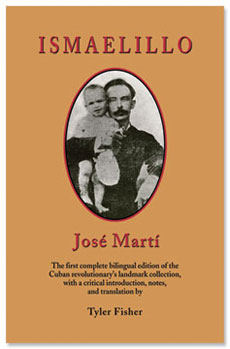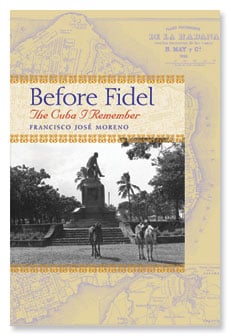The Cuban Enigma
Here are three books that plot a trajectory in the tormented life of Cuba, the island at our back door and one of the great enigmas of the American political imagination. This slender strip of land, not quite the size of Pennsylvania, defied American interests by nationalizing its sugar and fruit industries, switched alliances to the Soviet Union at the height of the Cold War, and allowed Soviet missiles to be installed and aimed at the U.S. mainland. As Noam Chomsky wrote in 2004:
For the United States, Cuba has long been the primary concern in the hemisphere. A declassified State Department document declares Fidel Castro to be an intolerable threat because he “represents a successful defiance of the United States, a negation of our whole hemispheric policy of almost a century and a half.”
Cuba preceded other defiant nations-from Venezuela to Iraq and Iran-now testing the power and authority of the United States as it still reels from the blows of 9/11. As a thorn in America’s side, Cuba has been the victim of 45 years of a strangulating embargo on exports, imports, tourist travel, and credit. Through it all, Cuba manages to maintain a 99.8 percent literacy rate, low infant mortality rates, and universal health care (ask Michael Moore) while half-starved and an orphan in the world.
José MartÃ’s poems to his son José Francisco, “little Ishmael” in the title, Ismaelillo, are a running diary of the loneliness, pain, and profound devotion to his son and the liberation of Cuba from Spain, written while in exile in Caracas, Venezuela, in 1881. The little book of 15 poems, his first in a prolific career as poet, translator, playwright, and father of Cuban modernismo, appeared a year later in New York and helped establish him as a principal figure in the struggle against three centuries of Spanish colonial rule.

Tyler Fisher’s new translations track MartÃ’s Spanish with great exactitude, preserving as much of the meter and the useable parts of rhyme (unlike English, Spanish is rife with natural rhyme), and capture the agonies of a man at 28 plotting his moves against a government that had exiled him at age 18 and knew his intentions. Reading Martà now, one has the feeling of peering into the mind of Fidel Castro in 1956, holed up in the Sierra Maestra Mountains on the eve of his final, successful push against dictator Fulgencio Batista.
The poems illuminate the psychology of a single, obsessive purpose growing in the mind of a Cuban Hamlet, someone talking himself into the fight even as he confesses to his absent son the nightmares he suffers.
Let us fight, not By the gentle Sunlight, but by Piercing sabers’ Fatal splendor … Let shrieks be heard As if all souls At once unshackled, Soaring, saw their Execution shrouds of flesh Roll round their feet: Now gird me with the Sturdy garb of Fearsome lances …
“Fierce Gadflies”
MartÃ’s poems laid the groundwork for Cuban poetry and fiction to come-a vision of life torn apart by political upheaval and uncertainty, an elusive dream of peace that remains just out of reach. Behind Cuban writing is the hovering spirit of Kafka raising questions about authority in this tropical zone. At one end of the island stands one of the most sinister metaphors of power in the region, “Gitmo,” the Guantanamo Bay Naval Base, and at its heart is the decaying, elegant capital of Havana.
Francisco Moreno’s memoir, Before Fidel, tracks the foreground of insurrection against Batista leading up to, but falling just short of, Castro’s rise to power in 1959. This is an interesting account of the early days of the struggle when Batista, a mulatto army sergeant, seized power in 1933 and became, in Moreno’s words, “a Yankee lackey.”

The end of 1934 and the beginning of 1935 saw the opposing camps clearly demarcated: Batista, the American embassy, American sugar interests and their Cuban associates on one side; the idealist nationalists and the socialist and communist groups on the other; and the rest of the country, probably the majority, neither here nor there, just observing the action with the apprehensive detachment of those who are powerless and know their fate is in someone else’s hands.
The outcome of the Spanish-American War allowed the United States several years in which to neuter the island’s independence and open its doors to American business interests. As Jean-Paul Sartre put it in 1960, in Sartre on Cuba:
[The Americans] stayed four years-time to establish their terms. When they finally ceded Cuba to its inhabitants-that was in 1903-they had neglected nothing in order to make of the newborn nation a future monster, equal to the geese of Strasbourg, who die slowly in the pains of a too delicious liver.
The Platt Amendment, added to the Army appropriation bill of 1901, gave to the liberators the right to return in case of trouble-that is to say, whenever it pleased them-and to liberate their Cuban brothers as often as might be necessary.
Curiously, Moreno is mostly silent on the issue of American influences over the island, or its hold on the sugar industry, Cuba’s principal export and cash cow. But in the years leading up to Castro’s revolution, sugar was king, and principally in American hands. Sartre is eloquent on the subject of Cuban sugar before Castro:
Produced in superabundance, sugar cane became the key factor of the Cuban economy. Other crops were overwhelmed, disappeared, or were never planted. Those which resisted were confined to the narrowest limits. The sugar industry developed to the detriment of the other industries.
Consider the luck of imperialism. By the very game of economic domination it creates among the oppressed needs which the oppressor alone is able to satisfy.
The diabetic island, ravaged by the proliferation of a single vegetable, lost all hope of self-sufficiency.
Instead, Moreno divides his memoir between a running history leading up to Batista’s fall and an account of his own life growing up in an upper-middle class household, his student days, and the changes that swept over Havana as the Batista regime rose and fell. The result is a sometimes jerky, discordant shift between two levels of experience. We get to know the personalities in his own groups and are told perhaps too much about the failed or partial attempts at overthrow launched by his own free-thinking kind. Around the corner from his secret meetings, the real plotters were at work getting ready to shake the world, but he leaves them out.
Nancy Alonso’s stories, Closed for Repairs, are an assessment of the damage done to a people reduced to rationed food since 1962 and high prices for fuel and imported goods, and trapped in a system that limits their freedom of speech and mobility. Havana in Alonso’s eyes is a decrepit sort of Prague, full of the reminders of colonial splendor and excess, but peeling and disintegrating under the pressures of a government frozen in place by the complicated chess game Castro played with the superpowers.
In this constricted and suffering world, water in the taps flows a few hours twice or three times a week. A pothole grows in the street until neighbors finally plant a tree and a few flowers in it to keep it from becoming a passage to China. This slender collection of 11 slices of life begins with “The Excursion,” a wry story about a man known only as “M” plotting a journey with backpack, rope, and provisions in search of a public phone that still works. Another, “Caesar,” opens:
It was during that time when all of us in Cuba raised or cultivated something. The fall of the Berlin Wall and a proliferation of cages, corrals, and fences on this island took place at the same time. While Europeans were tearing down barriers, here we were putting them up. It was a question of survival.
The tale is of a father who longs for “real food,” not the ersatz meat made from cabbage served by his wife. He wants to raise rabbits, decides on chickens, all the while observed and silently derided by the women. Finally, a pig is hauled up into the apartment, the Caesar of the title, and the family is too fond of it to think of ever eating the creature.
There’s a lot of Russian humor in these stories, not only because this is communism with all its warts, but because forbearance seems the principal inheritance of systems pitched too high morally and practiced too low in daily life. Even the bus driver in “The Trip” resembles one of those minor clerks in Gogol’s world, who refuses to take his passengers farther until they disembark and wait at the proper station. The passengers prevail at the end, and finally a begrudging compromise delivers Ines, the narrator, to her house on the last stop.
Alonso, a notable author with one other book, Casting the First Stone, to her credit, navigates a careful route through contemporary Havana, sticking with gentle satire and staying clear of hard, ideological battles with the authorities. The 11 vignettes build on one another and end with the title story, “Closed for Repairs,” in which Ramon, a punctilious clerk, takes over the job of ombudsman in the Department of Community Concerns. Complaints rain down on him from disgruntled citizens. He tries to fix what he can, but his office is besieged with demands for repairs to an aging, neglected capital. Finally, when a day-care owner hangs up a “closed for repairs” sign, it is instantly attended to and reopened. A proud and grateful owner of the day care center, Venancio, enters Ramon’s office smiling and presents him with the “closed” sign. After Venancio leaves, Ramon looks about his own shabby office and hangs the sign on the door. “Now let’s see what happens,” he says.
America’s long, relentless feud with Cuba has not buckled this little island nation’s knees. It has withstood the bleak, long winter of the embargo and has managed to eke out a few relations with friendly trading partners, including Canada. After the Soviet Union’s collapse in 1991, Cuba lost $6 billion in income and was reduced to hardscrabble for the rest of the 1990s. Venezuela came to Castro’s aid when Hugo Chavez was elected president in 1998, and other nations have been giving aid to Cuba by sly or overt means. The overwhelming attitude of the world has been to end the embargo, but America has not budged in nearly five decades as the Uriah Heep of the world. Every year the United Nations General Assembly votes to lift the U.S. sanctions, and every year the U.S. vetoes the motion. In 2006, only the U.S., Israel, the Marshall Islands, and Palau voted against the resolution. The U.S. vetoed lifting the sanctions this year as well. Just before imposing the embargo, John Kennedy ordered thousands of Cuban cigars to weather the impasse in comfort.
Paul Christensen writes frequently about contemporary issues. His most recent book is Strangers in Paradise: A Memoir of Provence (Wings Press).


